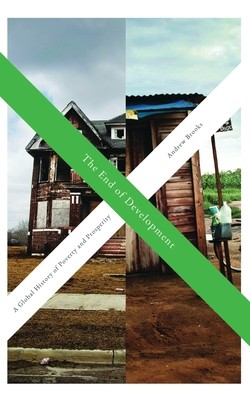
- We will send in 10–14 business days.
- Author: Andrew Brooks
- Publisher: Bloomsbury Publishing PLC
- Year: 2017
- Pages: 208
- ISBN-10: 1786990210
- ISBN-13: 9781786990211
- Format: 14 x 21.8 x 2.3 cm, kieti viršeliai
- Language: English
- SAVE -10% with code: EXTRA
Reviews
Description
Why did some countries grow rich while others remained poor?
Tracing the long arc of human history from hunter gatherer societies to the early twenty first century, Andrew Brooks rejects popular explanations for the divergence of nations. This accessible and illuminating volume shows how the wealth of 'the West' and poverty of 'the rest' stem not from environmental factors or some unique European cultural, social or technological qualities, but from the expansion of colonialism and the rise of America. Brooks puts the case that international inequality was moulded by capitalist development over the last 500 years.
The End of Development provides a compelling account of how human history unfolded differently in varied regions of the world. Brooks argues that we must now seize the opportunity afforded by today's changing economic geography to transform attitudes towards inequality and to develop radical new approaches to addressing global poverty, as the alternative is to accept that impoverishment is somehow part of the natural order of things.
EXTRA 10 % discount with code: EXTRA
The promotion ends in 22d.05:44:38
The discount code is valid when purchasing from 10 €. Discounts do not stack.
- Author: Andrew Brooks
- Publisher: Bloomsbury Publishing PLC
- Year: 2017
- Pages: 208
- ISBN-10: 1786990210
- ISBN-13: 9781786990211
- Format: 14 x 21.8 x 2.3 cm, kieti viršeliai
- Language: English English
Why did some countries grow rich while others remained poor?
Tracing the long arc of human history from hunter gatherer societies to the early twenty first century, Andrew Brooks rejects popular explanations for the divergence of nations. This accessible and illuminating volume shows how the wealth of 'the West' and poverty of 'the rest' stem not from environmental factors or some unique European cultural, social or technological qualities, but from the expansion of colonialism and the rise of America. Brooks puts the case that international inequality was moulded by capitalist development over the last 500 years.
The End of Development provides a compelling account of how human history unfolded differently in varied regions of the world. Brooks argues that we must now seize the opportunity afforded by today's changing economic geography to transform attitudes towards inequality and to develop radical new approaches to addressing global poverty, as the alternative is to accept that impoverishment is somehow part of the natural order of things.


Reviews